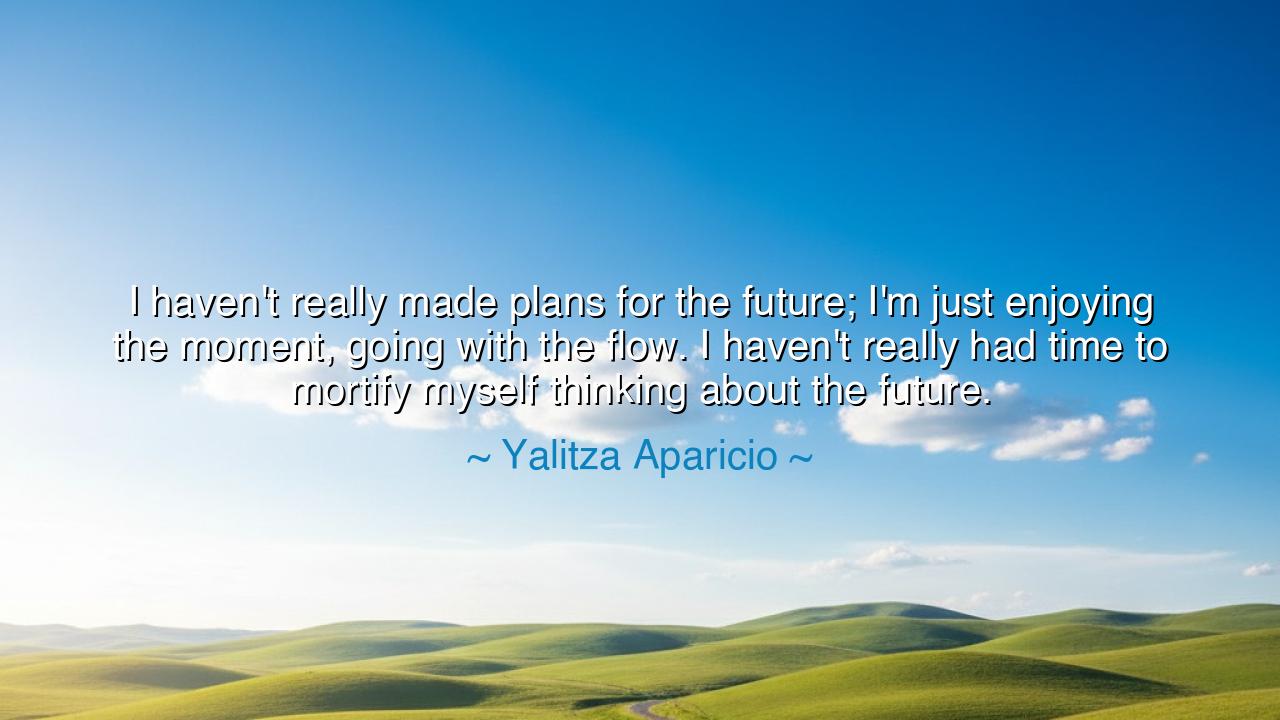
I haven't really made plans for the future; I'm just enjoying the
I haven't really made plans for the future; I'm just enjoying the moment, going with the flow. I haven't really had time to mortify myself thinking about the future.






In the modern age, where the pressure of planning and preparing for the future often dominates our lives, there is profound wisdom in Yalitza Aparicio’s words: “I haven’t really made plans for the future; I’m just enjoying the moment, going with the flow. I haven’t really had time to mortify myself thinking about the future.” These words speak to the value of living in the present—of embracing the flow of life as it comes, rather than being weighed down by the burdens of what lies ahead. In a world that often demands certainty and control, Aparicio’s stance reminds us that peace and fulfillment come not from obsessively planning the future, but from the freedom of surrendering to the present moment.
In the ancient world, philosophers like Epictetus and Marcus Aurelius advocated for a life that focused not on what could be, but on what is. The Stoics believed that while we cannot control the future, we can control how we respond to the present. Epictetus famously said, “We cannot choose our external circumstances, but we can always choose how we respond to them.” His words mirror Aparicio’s wisdom: to live freely is to release the burdens of future anxieties and instead immerse oneself in the present, appreciating the moments as they come. The ancient Stoics knew that the future is an unknown, and worrying about it only takes us away from the true power of the present moment.
Similarly, Buddha, in his teachings, spoke of the importance of being mindful and living in the here and now. To him, the future was nothing but a fleeting illusion, and the only truth we can hold is the present. Buddha’s call to live with awareness, to find peace in the present moment, echoes Aparicio’s sentiment. In his pursuit of enlightenment, Buddha emphasized that the root of suffering often lies in our attachment to the future or past. In a world constantly striving for what is to come, Aparicio’s declaration serves as a reminder to release the grip of future anxiety and embrace the beauty of what is unfolding before us.
In modern times, figures such as Steve Jobs also understood the power of living in the moment. Jobs often spoke about his desire to be fully immersed in the present, both in his creative work and in his personal life. He believed that the greatest ideas came not from constant worry about what might come, but from truly living and embracing the flow of experience. In his famous 2005 commencement address at Stanford University, Jobs reflected on how each step in his life—no matter how uncertain or chaotic it seemed at the time—led him to where he was. He called this the process of connecting the dots of life, not through planning, but by following one’s passion and allowing the journey to unfold naturally. Like Aparicio, Jobs found great clarity in surrendering to the moment.
The lesson from Aparicio’s words is not about neglecting the future entirely, but about striking a balance between the present and the future. It is a call to not let future plans weigh too heavily on our hearts, for when we are consumed by the worries of what is yet to come, we miss the life unfolding around us. Just as Alexander the Great made his mark not by obsessing over the distant future but by being fully engaged in the battles and opportunities before him, we too must find power in focusing on what is immediately in front of us. Greatness is found in our ability to seize the day, to engage fully with the now, and to trust that as we navigate the present, the future will reveal itself in due course.
In practical terms, this means allowing space in our lives for spontaneity, for embracing the unknown without fear. It is important to make plans, but it is equally crucial to not let the future become a source of constant stress. Like Aparicio, we must allow ourselves the freedom to trust that the path forward will become clear when the time is right. We must focus on what we can control—the present—and find joy and gratitude in the small, fleeting moments that make up our days. It means practicing mindfulness, being fully engaged with the people we love, the work we do, and the experiences we have in the now.
Ultimately, Aparicio’s words remind us that living is not about planning every moment ahead but about being fully present in each moment, trusting that our journey will unfold as it is meant to. Just as the ancients embraced the flow of life and focused on the present, so too must we find balance between the future and now. Let go of the weight of expectations and uncertainty, and in doing so, you will discover that the true gift of life is to be found right here, in the moment, where the world is unfolding around you.






AAdministratorAdministrator
Welcome, honored guests. Please leave a comment, we will respond soon